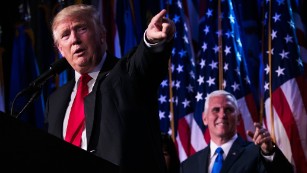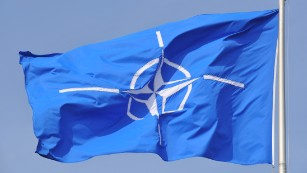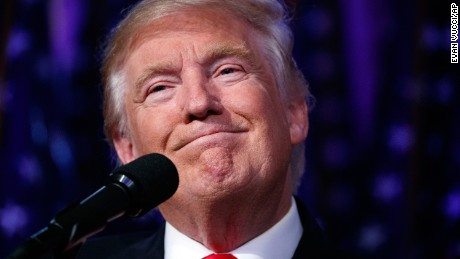World resigned, but wary of unpredictable Donald Trump
American allies woke up to Donald Trump's victory early Wednesday deeply unsettled, questioning whether the US will remain a stalwart partner and a stable pillar of the international order.
Trump himself promised change and uncertainty in his first major foreign policy address in April, saying he would "shake the rust off America's foreign policy" and that the US would "have to be unpredictable, and we have to be unpredictable starting now."
Early Wednesday, in his acceptance speech, he said he wanted to "tell the world community that while we will always put America's interests first, we will deal fairly with everyone."
French President Francois Hollande delivered an unusually bald response -- at a level of government where concerns are usually cloaked in diplomatic bon mots -- laying bare the risks international counterparts see in the wild card that is the US President-elect.
"These American elections open a period of uncertainty," Holland said. "I have to say this clearly and frankly."
Laying out the various issues France and the US collaborate on, including terrorism and climate change, Holland went on to say that "what's at risk is peace, the fight against terrorism, the situation in the Middle East, economic ties and the preservation of our planet."
RELATED: Why the country can be vulnerable during presidential transitions
Over the months of the 2016 campaign, the real estate mogul offered foreign policy positions that would rewrite bedrock alliances in Asia, Europe and the Middle East and re-work established international agreements, such as the Paris Agreement to stem climate change. He's emphasized isolationist, protectionist themes and adopted a slogan that echoes the "America First" group that advocated for the US to stay out of World War II.
Trump might apply those principles from the Oval Office in targeting two of President Barack Obama's most high-profile foreign policy achievements.
He has pledged to reopen the Iran nuclear deal that the Obama administration negotiated over years with a slew of international partners, including the UN. He has also said he would consider reversing recently thawed diplomatic relations with Cuba.
At the White House, Spokesman Josh Earnest was asked about the possibility that Trump could undo the president's legacy. "It's far too early to tell what decisions President-elect Trump will make and what impact they'll have on policies President Obama has worked so hard to achieve," Earnest said.
In statement after statement Wednesday, world leaders sought reassurance about their ties to the US. And after a bitter and divisive election campaign in which Trump was seen to marginalize and insult large groups of people, many looked for a reaffirmation of the values they associate with the world's most powerful country.
German Chancellor Angela Merkel offered her country's cooperation, but with strings.
"Germany and the United States (are) joined by common values -- democracy, freedom, respect for the law and human dignity -- regardless of skin color, religion, gender, sexual orientation or political beliefs," Merkel said. "Based on these values, I offer close cooperation to the future president."

Will President-elect Trump deliver on campaign promises?
European Council President Donald Tusk, who is wrestling with a migrant crisis driven by Syria's civil war and with Russian aggression along the Baltic states and in Ukraine, said that, "While respecting the democratic choice of the American people, we are at the same time aware of the new challenges that these results bring. One of them is this moment of uncertainty over the future of our transatlantic relations."
If Trump is to be taken at his word, there will be substantial many question marks about the future of US relations across the Atlantic and Pacific.
In Europe, Trump has questioned whether NATO is still relevant and demanded that member states pay more for defense spending. Trump has praised Russian President Vladimir Putin as a strong leader, despite Russia's military incursion into US ally Ukraine and its annexation of Crimea, which triggered Western sanctions.
That act violated a central tenet of modern international relations -- that national borders are inviolate. But Trump has suggested that he and Putin will work well together and that Russia "is not going to go into Ukraine."
Putin congratulated Trump in a statement, saying, "Russia is ready and wants to restore the full-fledged relations with the US." He added that it would "serve the well-being of both Russia and American peoples."
Russian parliament member Vyacheslav Nikonov told CNN's Christiane Amanpour that Moscow thinks Trump "understands some realities" about Russia and Ukraine, as well as sanctions.
"Being a businessman, he understands too well that these sanctions are harmful -- not just for the Russian economy, they are also harmful for the European economy and for the American economy," said Nikonov.

What Trump says about NATO and what it actually does
"Sanctions depend on the United States," he added. "If America has a will to lift sanctions, they will be lifted by the European Union the next day."
In another move that would counter international consensus, Trump has said he'd like to move the US Embassy in Tel Aviv, Israel, to Jerusalem. Previous US administrations and other countries have avoided such a shift because the disputed city isn't internationally recognized as the capital of the Jewish state. In a video address to Trump, Israeli Prime Minister Benjamin Netanyahu told him that he's "a great friend of Israel, over the years you've expressed your support consistently, and I deeply appreciate it. I look forward to working with you to advance security, prosperity and peace."
Trump has also said America's Arab allies will have to do "the fighting" in conflicts in Syria and Iraq, blasting Gulf states such as Saudi Arabia, the United Arab Emirates and Qatar for "not doing much" at an August rally in Virginia. "The Gulf states have nothing but money," Trump said. "I'm going to get them to pay."
In Asia, Trump has suggested he'd make serious changes. He is open to a major departure from current policy by talking to North Korea to push them to halt their nuclear program, a possibility that Director of National Intelligence James Clapper has said wouldn't succeed.
Pyongyang wants to be recognized as an equal to the US and seeks talks to demonstrate that. The Obama administration won't consider engaging with the government of Kim Jong Un until North Korea starts denuclearizing.
"I would speak to him," Trump told Reuters in May. "I would have no problem speaking to him."
Trump has also voiced frustration about post-World War II alliances with South Korea and Japan, saying that the two don't contribute enough to their collective security agreement. In March, he suggested that the US could pull back and more seriously arm the two countries so they could better defend themselves.
"Right now, we're protecting, we're basically protecting Japan," Trump told the New York Times. "And there'll be a point at which we're just not going to be able to do it anymore."
News Courtesy: www.cnn.com











